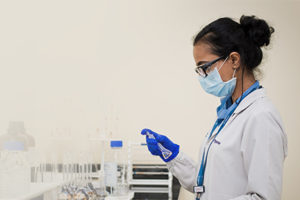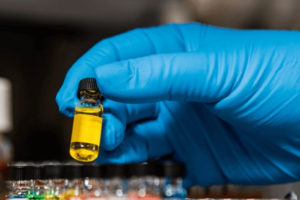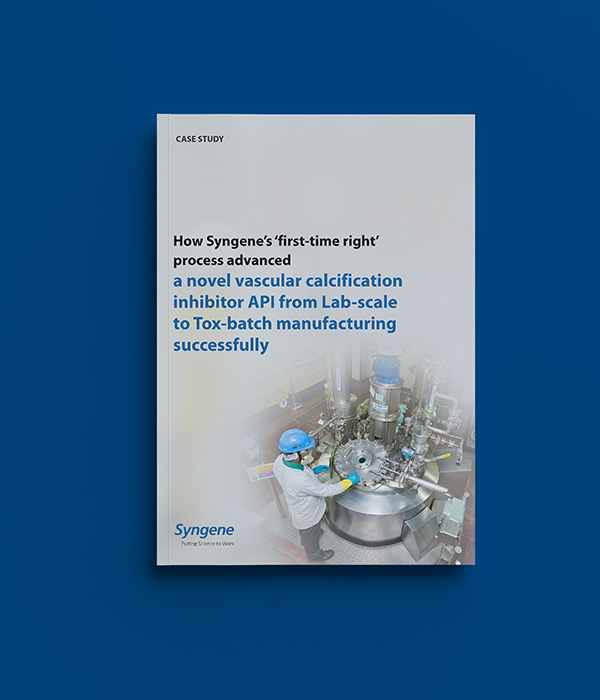Overview
A leading pharma company had developed a small molecule drug candidate to treat vascular calcification disorders. The molecule was developed using an 8-step synthetic process. The company decided to partner with Syngene for the chemical development of the molecule for non-GMP and GMP manufacturing.
The Syngene team recommended a thorough mechanistic investigation to satisfy Safety, Environment, Legal, Economics, Control, and Throughput (SELECT) criteria before preparing the first few kilograms of this molecule in bulk. We developed an improved and scalable method based on six factors to ensure a first-time-right manufacturing process. These included chemical yield, cycle time, number of chemical steps, isolation of all intermediates in reasonably pure form, use of higher molecular weight protecting group and reagents, and several energy-consuming operations.
Syngene went on to successfully demonstrate the effectiveness of the new process by manufacturing 10 kg technical batches of the molecule. We are now proceeding with 50kg GMP manufacturing of this novel chemical entity for its use in first-inhuman clinical trials.
The Challenge
A pharmaceutical company’s research team had developed an 8-step process to develop a life-saving small molecule drug for patients suffering from vascular calcification disorders.
The company decided to partner with Syngene to develop and manufacture non-GMP and GMP quantities of this target molecule. The selection was based on Syngene’s technical capability and 28 years of rich experience in serving global clients. We were required to develop the manufacturing process of this drug as its magnesium salt. The key challenges in the original synthesis were as follows:
- Lack of any isolation of intermediates due to their aqueous solubility and poor stability
- Inefficient phosphorylation of hydroxyl groups (which is a problem, especially when they are vicinal)
- Deprotection of phosphate substituents in a mild manner to facilitate isolation and purification of the final product.
Other complexities
Most of the technologies required for synthesizing this molecule involve protecting specific hydroxyl groups, phosphorylation, and deprotection methods. The major challenges in synthesis are the efficient preparation and isolation of intermediates and efficient phosphorylation of hydroxyl groups (which is a problem, especially when they are adjacent). Also, mild deprotection of phosphate substituents to facilitate isolation and purification of the final product. The phosphorylation of polyols in carbasugar is always challenging, given that the hydroxyl groups at the axial positions are unreactive, leading to partial phosphorylation.
Yet another critical process step involves the oxidation of phosphorous using hydrogen peroxide. This process causes an adiabatic temperature rise of 200C at a laboratory scale which can easily go out of hand.
The Solution
As a first step, Syngene recommended a thorough mechanistic investigation to satisfy SELECT criteria when preparing the first few kilograms of this molecule in bulk. We decided to develop an improved and scalable method based on six factors to ensure a first-time-right manufacturing process. These included chemical yield, cycle time, number of chemical steps, isolation of all intermediates in a reasonably pure form, use of higher molecular weight protecting group and reagents, and several energy-consuming operations.
An early-stage safety investigation combined with more ‘classical’ process development through reduced concentration and controlled dosing resulted in a positive outcome during lab scale-up operations.
A synthetic process to get carbasugar polyphosphate was developed and improved. Our efforts during process optimization improved reaction yield and reduced the impurity level, lowering the cost of goods (CoG). Further, all intermediates were isolated, leading to improved yield across several development steps.
We also developed a purification method using recrystallization, solvent washing, and silica pad filtration. We achieved efficient phosphorylation of hydroxyl groups using Dibenzyl N, N-diisopropylphosphoramidite followed by hydrogenolysis of the benzyl protecting groups to obtain pure phosphate.
Technologies used |
|---|
HPLC-CAD used for purity analysis |
Mass spectroscopy used for checking impurity structures |
Ion chromatography used for magnesium content analysis |
During phosphorylation, we identified major issues such as poor selectivity, formation of side products, and sensitivity towards moisture. To overcome these issues, we developed an appropriate process condition by introducing a controlled addition of reagents with appropriate reagents stoichiometry at low temperatures. This process change led to an improved yield of 60% of the desired product compared to the original average yield of 20-30%.
Our ‘first-time right’ process for manufacturing non-GMP volumes of the drug resulted in a first-grade toxicology material for use in Tox studies. Our scalable process helped us achieve timely delivery of bulk supplies of the API with the desired quality specification using a safe process to advance this molecule to the next stage of development.
Conclusion
Once Syngene had successfully demonstrated the small-scale synthesis of this molecule, the pharma company requested a lab-scale synthesis of 25-50g as a proof-of-concept. Syngene delivered 50g of the target molecule. Our new process resulted in overall yield improvement by several folds. Moving from lab-scale to non-GMP scale, Syngene produced 10kg of the molecule through an improved synthesis while meeting chemical purity requirements of >98%.
Currently, Syngene is engaged in GMP manufacturing of 50kg of the molecule for the supply of clinical batches. This will be followed by an expected reload campaign of 90kg GMP material in Q2 of 2024.
The project demonstrates Syngene’s technical capabilities in developing highly complex and challenging molecules, including supporting large-scale manufacturing for different phases of clinical trials.
To learn more about our Chemical Development capabilities, contact our team.







